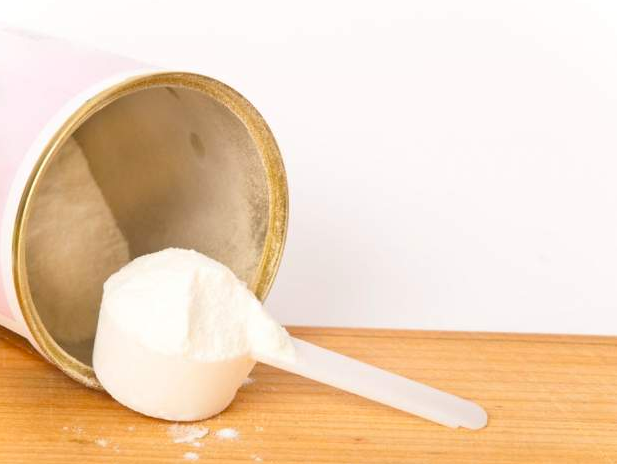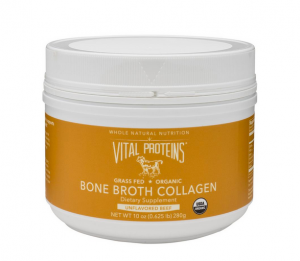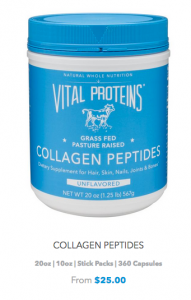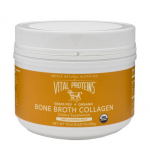What Type of Collagen is Best
When it comes to what type of collagen is best, you must first know that there are a few terms that are interchangeable so you don’t get confused. Gelatin is collagen that has been cooked down. Collagen or Collagen Peptides have been processed further into smaller pieces.
Gelatin and collagen are two proteins that are commonly associated with health benefits such as healing leaky gut, preventing wrinkles, improving digestion, and reducing joint pain.
Oftentimes, you may see gelatin and collagen used interchangeably. But while they come from the same sources— bones, skin and tissue— they’re not the same thing.
The Gelatin Version of Collagen vs Collagen Peptides
As mentioned, collagen is found in bones and tissue. Since it’s too tough to eat tendons or ligaments, these parts must be cooked down using a process called partial hydrolysis, to make the collagen digestible. The hydrolyzing and drying of the bones and tissue is what forms gelatin powder. In other words, gelatin is the cooked form of collagen.
Making bone broth is one of the most delicious ways to get more collagen and gelatin into your diet. By simmering bones and tissue in water with other aromatics for 20 to 24 hours, the collagen and gelatin get released from the bones and make their way into your tasty soup.
When it comes to collagen supplements, you may have heard of hydrolyzed collagen or collagen peptides. This form of collagen is simply gelatin that has been more aggressively processed through hydrolysis to form smaller proteins, which can be easily digested and absorbed by the body.
Simply put, the differences between collagen and gelatin come down to how they’re processed. The processing method is what gives collagen and gelatin different textures, unique health benefits, and allows them to be therapeutic in different ways.
So, should you use collagen peptides or gelatin? Let’s take a quick look at the similar health benefits of collagen and gelatin, followed by their differences, so you can decide which one is best for you.
What Collagen Peptides and Gelatin Have in Common
First, let’s break down the makeup of each. Since collagen and gelatin are derived from the same sources, the have identical amino acid profiles. Most of the amino acids found in gelatin and collagen are highly anti-inflammatory (unlike some other animal proteins), which makes them beneficial for supporting overall health and well-being.
Gelatin and collagen contain the amino acids proline and glucosamine, as well as proteins called glycosaminoglycans. All of these nutrients support joint health by promoting the growth of new cartilage, and cushioning the joints (1)(2). Having more of these nutrients has been found to help reduce the pain associated with arthritis, osteoarthritis and rheumatoid arthritis.
Another amino acid found in gelatin and collagen is glycine. As a powerful natural anti-inflammatory, glycine also helps to improve joint pain, but has the added benefit of supporting healthy nervous system function, improving sleep quality, building collagen, and strengthening the intestinal lining (3)(4). As you can see, glycine is one of the reasons why collagen and gelatin provide health benefits to the entire body.
Lastly, one of the most important nutrients for healthy, younger looking skin is collagen.
As the most abundant protein found in your skin, collagen helps preserve skin elasticity to keep it smooth, supple and youthful. Since our bodies begin to produce less collagen once we hit age 25, getting collagen and gelatin through your diet is especially helpful to improve your skin’s appearance from the inside out (5). As a protein, collagen is also a primary building block for healthy teeth, bones, hair and nails (6). When looking at what type of collagen is best for you, consider the following:
What type of collagen is best for you?

Benefits of Gelatin Collagen
When collagen is boiled, partially hydrolyzed, and dried to form gelatin, it turns into a brittle, dry powder. But when mixed with hot liquids, it dissolves into a gel-like substance (hence the name gelatin). If you’ve eaten Jello before, you’ve had gelatin.
The gelatinous texture of gelatin is what makes it useful as a thickener in your recipes (such as homemade gravies, vitamin gummy bears, and soups). The gel-like texture also determines how it’s digested and absorbed by your body, which can influence certain aspects of your health — from blood sugar balance to intestinal repair.
Gut Repair
Picture gelatin as a thick, goopy gel when it’s being digested and absorbed in your intestinal tract. It moves sluggishly and is slower to digest, which is why it’s said to help soothe and coat the gut lining.
Since gelatin is 30% glycine, it’s one of the richest sources of glycine on the planet. Glycine has been shown to improve gut health by repairing the intestinal wall, and sealing the gut lining — which is essential for healing leaky gut syndrome and the autoimmune conditions that stem from leaky gut, such as rheumatoid arthritis and allergies (7)(8).
The benefits of gelatin for healing the GI tract also make it one of the top foods to eat on the GAPS diet, which is a gut health protocol designed to help repair the gut lining and heal digestive symptoms, leaky gut syndrome and autoimmune diseases.
Blood Sugar Balance
One study showed that when gelatin was consumed with sugar, it reduced the glucose response by nearly 50% (9). This suggests that gelatin is an effective protein for reducing blood sugar spikes and crashes when consumed with high carb meals. Therefore, gelatin may also be helpful for managing and improving type 2 diabetes and other blood sugar imbalances (10).
It’s possible that the slow digestion and absorption rate of gelatin is one factor that allows it to reduce insulin spikes, but the study specifically mentions the high glycine content in gelatin for reducing the glucose response. Since collagen peptides also contain glycine, it’s possible they may have a similar effect. When looking at what type of collagen is best, I use this version/gelatin for this very reason!
Digestive Health
Gelatin may improve bowel regularity, and relieve bloating and constipation. Its gel-like texture absorbs water and helps keep fluid in the intestinal tract, which is needed to promote healthy and regular bowel movements.
Gelatin has also been shown to increase gastric acid (stomach acid) production, which improves digestion and nutrient absorption.
Side Effects of Gelatin
Some may experience digestive symptoms such as gas, bloating, and heartburn when first adding gelatin to their diets, or from eating too much. This is because the larger molecules of gelatin are ‘heavier’ and can be harder to digest.
To avoid these symptoms, it’s best to start with a small serving size of gelatin (such as 1 teaspoon) and gradually increase to 1 to 11/2 tablespoons.
Key Health Benefit of Collagen Peptides (Hydrolyzed Collagen):
Easier to absorb
Collagen peptides provide the same health benefits as gelatin, however there is an advantage to taking collagen peptides over gelatin.
As we covered, powdered collagen supplements are gelatin that’s been processed more aggressively using hydrolysis, which forms smaller molecules called short chain peptides.
These short chain peptides are easier for your body to digest and absorb, which means the amino acids in hydrolyzed collagen may be more bioavailable and cause fewer digestive symptoms. Not only that, it’s possible that because collagen peptides are easier to absorb, you may notice the health benefits of collagen sooner when taking peptides, compared to gelatin powder.
Summary of Gelatin Vs. Collagen Health Benefits
What type of collagen is best for you?

My Personal Bone Broth Trick On Handling Sugar/High Carb Meals
I take one of these beef bone broth sticks with me, put it in coffee or any other drink toward the end of my meal.
As you can see, gelatin and collagen both provide many of the same incredible health benefits, so there really is no ‘wrong’ choice when deciding what type of collagen is best. Whether you choose gelatin or collagen comes down to how you want to use it (ie: do you want to mix collagen in your smoothies, or add texture to your recipes?), and which form of collagen your body responds best to.
And don’t forget, in addition to supplements, you can also get collagen and gelatin in your diet the original way: by drinking bone broth. The simmering time of the bones (up to 24 hours) allows collagen and gelatin to be released into the broth, which many believe is digested quicker than a powder.
Summary of Difference Between Collagen, Collagen Peptides, Gelatin and Hydrolyzed Collagen
- Collagen is the most important structural protein in the body. However, full length collagen is ineffective as an oral supplement because of its long, twisted shape.
- Collagen peptides and gelatin are made by breaking down full length collagen molecules. Collagen peptides are more bioavailable and digested more quickly than gelatin due to their shorter length.
- Hydrolyzed collagen and collagen peptides are two names for the same product.
- Gelatin is collagen that has gone through partial hydrolysis, which makes it gel. Gelatin is not absorbed as well and is less versatile than collagen peptides.
- Bone broth is made by slowly cooking bones and cartilage in water to form gelatin. Collagen peptides are more easily absorbed into the bloodstream than gelatin, so bone broth does not have the same healing ability as collagen peptides.
My Personal Collagen Strategy
I keep collagen peptides as a consistent staple in my diet, and I use 1 serving a day either in coffee or with one of my health drinks. I’ve also tossed it in eggs, soups, and water (before going to bed to really amp up the repair process.) If I’m drinking a bone broth that day, I mix it in for the most powerful collagen drink you can get (both gelatin and peptides). If I had to answer the question to “what type of collagen is best” with only one response, it would be “Vital Proteins Collagen Peptides.”
When I’m recovering from an injury, dealing with any additional inflammation, or if I’m about to consume a high carb meal, I use bone broth collagen (gelatin in a dry form) in addition. You could call this a collagen stack. Now this particular collagen says “unflavored” and it is, but it does have a little aroma – much like a light bullion smell. It’s fairly tasteless, but when you do the water test (mix in water and drink), there is a hint of a taste. It’s not bad, but you can tell the water has “something in it.” When I mix it with my orange flavored ketones, it mildly dulls the tartness. I like this beef collagen product as it has the most dense nutrition you can get in terms of collagen. Some report there is no flavor at all. It’s designed to be mixed in warm liquid, so it’s perfect for broth, coffees, warm teas, soups and such.
Both of these formulas were selected from years of collagen use, research, and experimentation starting back in the 90’s when we were first introduced to a hydrolyzed protein called Calorad. 1 tbsp of this stuff and folks started losing weight, looking younger, sleeping better, and feeling better. I knew there was something powerful going on, but the company soon went out of business. Knowing that collagen is the #1 most important protein in the body, I focused on finding the best sources of this while the industry focused on what the market was after – muscle building, meal replacement and weight loss. So that meant mostly soy, whey, and other proteins. Now the word has finally gotten out, and thanks to the resurgence of bone broth as a fountain of youth to celebrities, collagen is back!
The Coffee Test: What type of collagen is best in Coffee?
***** Hands down, Collagen Peptides is the winner here – you can detect no presence of anything. Coffee remains perfect
*** Bone Broth Collagen (beef) dissolves well and barely gives a hint of its presence in black coffee. If you use cream/sugar/flavoring/bulletproof coffee; you can’t really tell anything else is in it. If you are using any kind of sweetener (STOP!)…USE ALLULOSE. (Opens in new tab)
Collagen to me has never been a fad. In fact, it’s one of the 4 pillars of nutrition that we are missing in our diets today. Be sure to read Deep Nutrition by Catherine Shanahan, MD. I am 49 (almost 50) and have rapidly recovered from a blown ACL (skiing accident) much like a young athlete. I coupled collagen with exogenous ketones and stayed 4 weeks ahead of typical recovery times. I lost fat, preserved muscle, kept inflammation in check, never took any pain meds, and focused on taking care of may patients while I practiced what I preach (with a little over-doing it as expected).
Of the two types of collagen you will see in the marketplace, gelatin (including bone broth) collagen and collagen peptides, the collagen peptides take the title and win the “what type of collagen is best” award. This is because it is the most versatile, cost effective, and easiest to digest. The gelatin version is known to have denser nutrtition and additional benefits that I can’t leave on the table, so I use both.
References:
- Trentham DE1, Dynesius-Trentham RA, Orav EJ, Combitchi D, Lorenzo C, Sewell KL, Hafler DA, Weiner HL. Effects of oral administration of type II collagen on rheumatoid arthritis. Science. 1993 Sep 24;261(5129):1727-30.
- Bannai, M., Kawai, N., Ono, K., Nakahara, K., & Murakami, N. (2012). The Effects of Glycine on Subjective Daytime Performance in Partially Sleep-Restricted Healthy Volunteers. Frontiers in Neurology, 3. doi:10.3389/fneur.2012.00061
- Weight loss maintenance: Predictors of successful weight loss maintenance: a qualitative comparative analysis.” Bdj217.9 (2014): 525. Web.
- Ruiz-Ramírez, Angélica, Ely Ortiz-Balderas, Guillermo Cardozo-Saldaña, Eulises Diaz-Diaz, and Mohammed El-Hafidi. “Glycine restores glutathione and protects against oxidative stress in vascular tissue from sucrose-fed rats.” Clinical Science126.1 (2014): 19-29. Web.
- Papakonstantinou, Eleni, Michael Roth, and George Karakiulakis. “Hyaluronic acid: A key molecule in skin aging.” Dermato-Endocrinology 4.3 (2012): 253-58. Web.










